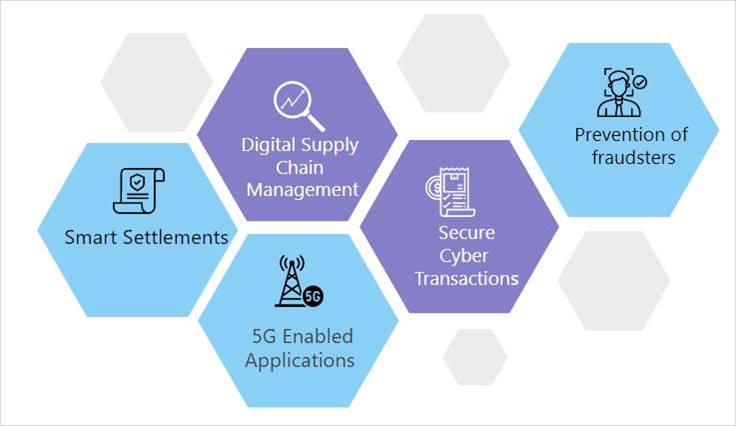Blockchain: A catalyst for the digital transformation of Service Providers
According to 3.4 billion by 2026,” Blockchain will generate $3.1 trillion in new business value by 2030, but with the technology set to be ready for more mainstream adoption through 2023, organizations should be exploring it now”
Digital transformation leads to an explosion of data. As a result, the business landscape of the Service Providers has evolved. The Digital Service Providers (DSPs) are no longer dependent on traditional services which fail to fulfil their customer needs and prevent them from realizing the potential value of the upcoming shared economy. There is an increasing need to simplify, streamline, and secure transactions of different kinds, and blockchain can effortlessly play a vital role in realizing this.
What hinders the transformation journey of DSPs today?
As the current business models are heavily data-driven, many DSPs struggle to reinvent products/services and stay ahead of the competition. This forces the DSPs to innovate continuously to be relevant in the customer value chain. The major pain points in the DSPs’ current landscape are:
- Lack of real-time updates to different systems leading to data inconsistency and duplication
- Inefficient security mechanisms failing to protect the customer data
- Numerous fraudulent activities causing revenue leakage
- Business transactions across multiple third parties with no consensus, leading to a dispute
DSPs can overcome these challenges and gain a competitive edge by embracing blockchain.
Embracing Blockchain to stay ahead of the competition
For DSPs looking for innovative ways to reduce the underlying costs and improve business profitability, Blockchain adoption can be a great fit. Blockchain’s inbuilt capabilities like the smart contract, cryptographic security mechanism, and data storage in decentralized ledger help to manage various decentralized applications with an agreed contract, in an autonomous way. It helps to establish consensus among all the parties and promotes trust in the ecosystem. Hence, blockchain can truly enable “Anything as a Service” for consumers.
Blockchain use cases in DSPs’ landscape
Blockchain adoption can enable DSPs to be profitable and relevant in the digital economy. The adoption strategy can be of two types:
- Vertical strategy, where a new set of business models or use cases can be derived to generate a new revenue stream
- Horizontal strategy,where the existing system can be integrated with blockchain to add business value or reinvent the new sources of revenue.
Based on our ongoing conversations with the DSPs around the globe, we see that there are five use cases where blockchain can add immediate and tangible value.

Fig 1. Blockchain-powered use cases in DSPs’ landscape
- 5G enabled applications:
Today most DSPs have started deploying 5G which paves the way for new use cases like City Pass, Smart Tolls, Smart Grids, and multi-edge clouds solutions. These new-age solutions demand the development and maintenance of a complex application ecosystem. This leads to an increase in CapEx and deployment time. Some of the important features of Blockchain such as tamper-proof data storage, fault tolerance, and decentralized data distribution allow 5G users to exchange data between their peers, eliminating the centralized operational requirement. It ensures data provenance, accountability, and maximum security for all users. - Smart Settlements:
Current settlements go through various audit processes carried out by third parties leading to errors and lack of transparency. The current process also takes a long time, causing delays in revenue realization. Smart settlements on blockchain enable automation and guarantee settlement between the participants by routing from one operator’s blockchain to another, thus providing the end customer with increased transparency.
For example, if a subscriber uses his phone network while roaming, then this transaction is logged and saved on the Blockchain network (from start to end). The smart settlement will define the charges and the way payment is registered. This end-to-end transparency ensures the integrity of the transaction. - Digital Supply Chain Management:
Current operation services provided by DSPs contain a multi-threaded supply chain ecosystem that requires interdependent teams. Also, supply chain data is not always visible, available, or trustworthy. Digital supply chain management on the blockchain can solve process inefficiencies and improve transparency by building resilient supply chain systems. It enables DSPs with automatic and streamlined partner onboarding, asset management, and order management. - Secure Cyber Transactions:
DSPs have evolved from accepting payments only via cash to building cashless economies. Today, as transactions happen through multiple payment gateways, achieving a secure and transparent process has become a challenge. Blockchain-powered transactions are immutable because they cannot be deleted or changed. It facilitates fast, secure, and low-cost international transactions with encrypted distributed ledgers. Further, it enables real-time verification of transactions without the need for intermediaries. - Prevention of fraudsters:
Technology improvements have enabled fraudsters to outsmart traditional fraud management as data is exchanged in real-time. According to a report by Deloitte, “DSPs lose ~ USD 40 Bn every year due to fraudulent activities”. In addition to cost, it can decrease create an unstable business environment as well as undermine business and consumer relationships.
Blockchain combined with traditional rule-based security creates an unalterable record of transactions with end-to-end encryption, closing the doors for fraud and unauthorized activities. Additionally, data on the blockchain is stored in a Peer-to-Peer(P2P) network, making it nearly impossible to hack, thus making DSPs less susceptible to fraud.
Conclusion
Blockchain has immense potential in accelerating the DSPs’ digital transformation journey with its inbuilt functionalities like decentralized storage and cryptographic data security. The rapid adoption of blockchain reduces the dependency on traditional centralized software to provide an authentication mechanism. Thus, DSPs’ transformation journey lies in combining their strengths in connectivity and leveraging blockchain for its security, trust, and speed.



